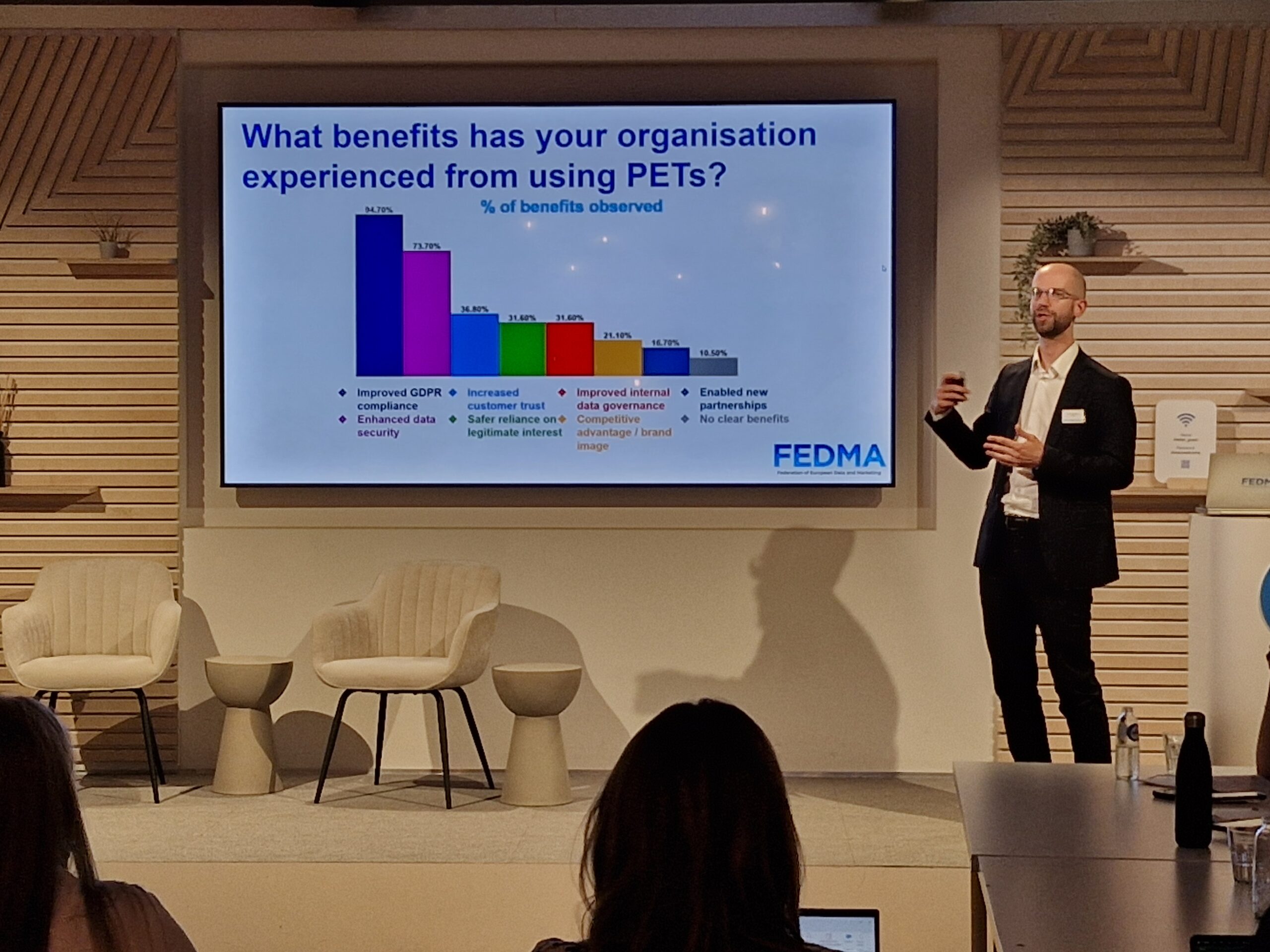Bridging trust and innovation: key takeaways from the stakeholder workshop on PETs in advertising & marketing

The Federation of European Data and Marketing (FEDMA), in partnership with Google, recently organized a workshop, an invitation-only forum for industry stakeholders, technical experts, and civil society representatives to explore the opportunities and challenges of Privacy Enhancing Technologies (PETs) in the advertising and marketing ecosystem. While participants acknowledged the promise of PETs, the discussion also surfaced significant legal, technical, and strategic uncertainties that must be addressed to unlock their full potential.
PETs and perceived trade-offs in advertising performance
A recurring concern among participants was the alleged perception that PET-enabled advertising may be less accurate or effective than traditional advertising tools. Despite advances in Synthetic Data,Trusted Execution Environments, Differential Privacy and other PETs, many stakeholders fear that some PET-based products could fall short of the precision marketers are used to. This creates hesitation across the industry, especially in performance-driven environments, and underscores the need for ongoing testing, real-world benchmarks and transparent performance evaluation frameworks.
How PETs fit in the GDPR’s risk-based approach
Participants agreed that PETs improve the safety and governance of data but emphasized that no technology can guarantee 100% protection. However, the current regulatory climate, particularly among some Data Protection Authorities (DPAs), is seen as leaning toward zero-risk expectations, creating a chilling effect. Many companies are hesitating to invest in PETs if they fear that even well-intentioned deployment could still be scrutinized or penalized, which in turn could hurt European innovation. Stakeholders called for a more balanced, risk-based interpretation of the GDPR when dealing with PETs, aligned with the regulation’s own principles. Ideas floated during the discussion included developing a common risk taxonomy, auditable KPIs, or even a methodology for evaluating PET effectiveness, to make regulatory expectations more practical and predictable.
Regulatory incentives: what's in it for companies?
Another key point of uncertainty is the lack of clear regulatory benefits for adopting PETs. While the technology can support compliance, companies often ask: what do we gain from using PETs, especially if regulators may still find fault? To address this, participants stressed the need for regulatory incentives to provide companies with greater legal certainty and encourage investment in privacy-preserving innovation.
Global convergence and the role of OECD
PETs are being developed and deployed across jurisdictions, but cross-border inconsistencies pose serious challenges. Some PET solutions recognized and accepted outside the EU may not be considered adequate under EU standards. Stakeholders stressed the need for international convergence and standardization, ideally under the auspices of a multilateral forum like the OECD, to foster legal interoperability and facilitate global adoption.
PETs and the future EU’s Data Union vision
Participants identified the upcoming EU Data Union Strategy as a possible opportunity to mainstream PETs as enablers of trust, innovation, and cross-border collaboration. Today, access to PETs is often limited to large, well-resourced companies. The new strategy should aim to democratize PETs, and support open-source solutions and SME inclusion.
Communicating PETs without privacy-washing
While PETs are often promoted as privacy solutions, stakeholders warned against “privacy washing”, overstating the protections they provide without meaningful safeguards or accountability. There was strong consensus that consumer trust depends on clear, transparent communication. To that end, participants discussed the need for audibility and layered explanations of PETs, combining technical transparency with user-friendly messaging. Participants also aligned on the need for industry standards, labels and/or certifications to increase trust in PETs and address the concerns over privacy-washing. This would allow consumers to understand not only what is being done with their data, but also why it matters for their privacy.
Looking ahead: The workshop highlighted a shared ambition to make PETs a foundational element of privacy-respecting advertising and marketing. To that end, the ecosystem needs more clarity, coordination, and confidence from both regulators and industry. FEDMA will continue to foster dialogue and collaboration to shape an enabling environment for PETs that is effective, fair, and future-proof. The outputs of this workshop will be used in a policy paper that FEDMA is drafting and will be presenting to policymakers later this year.











